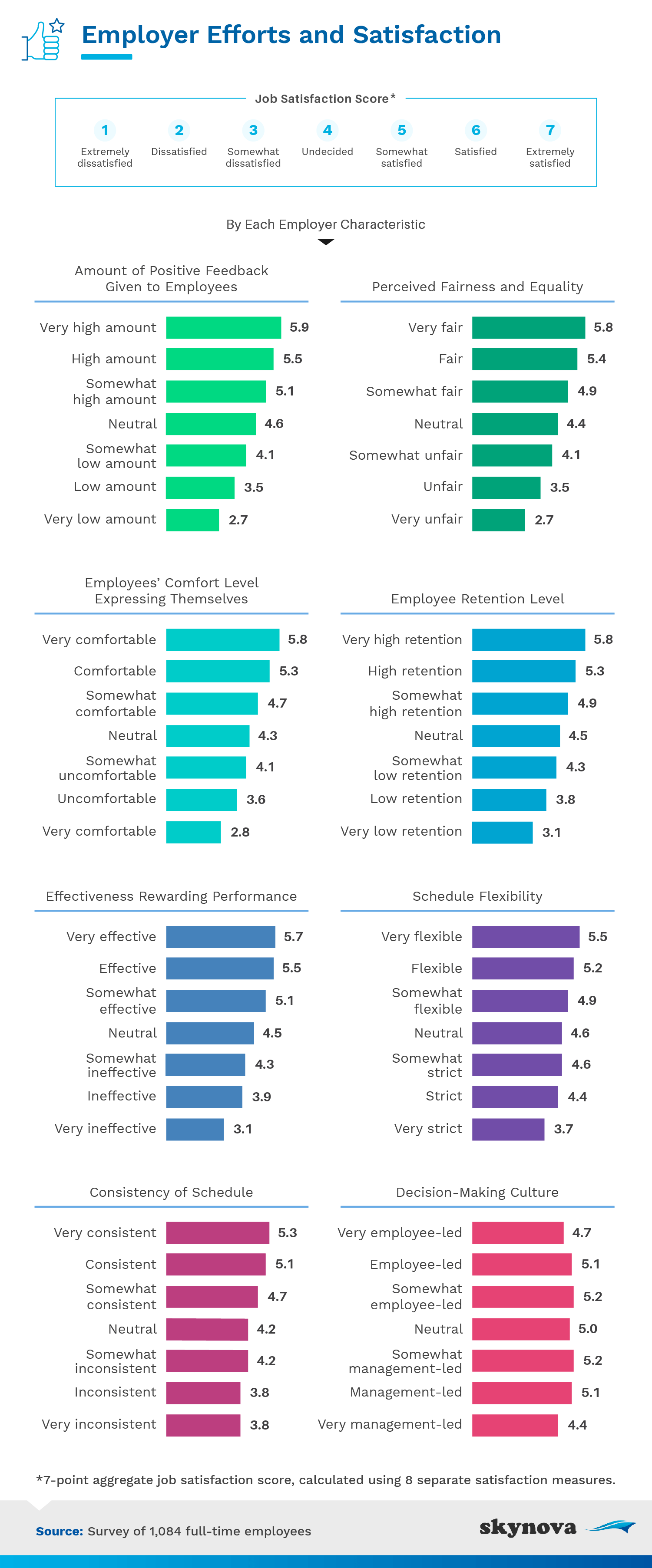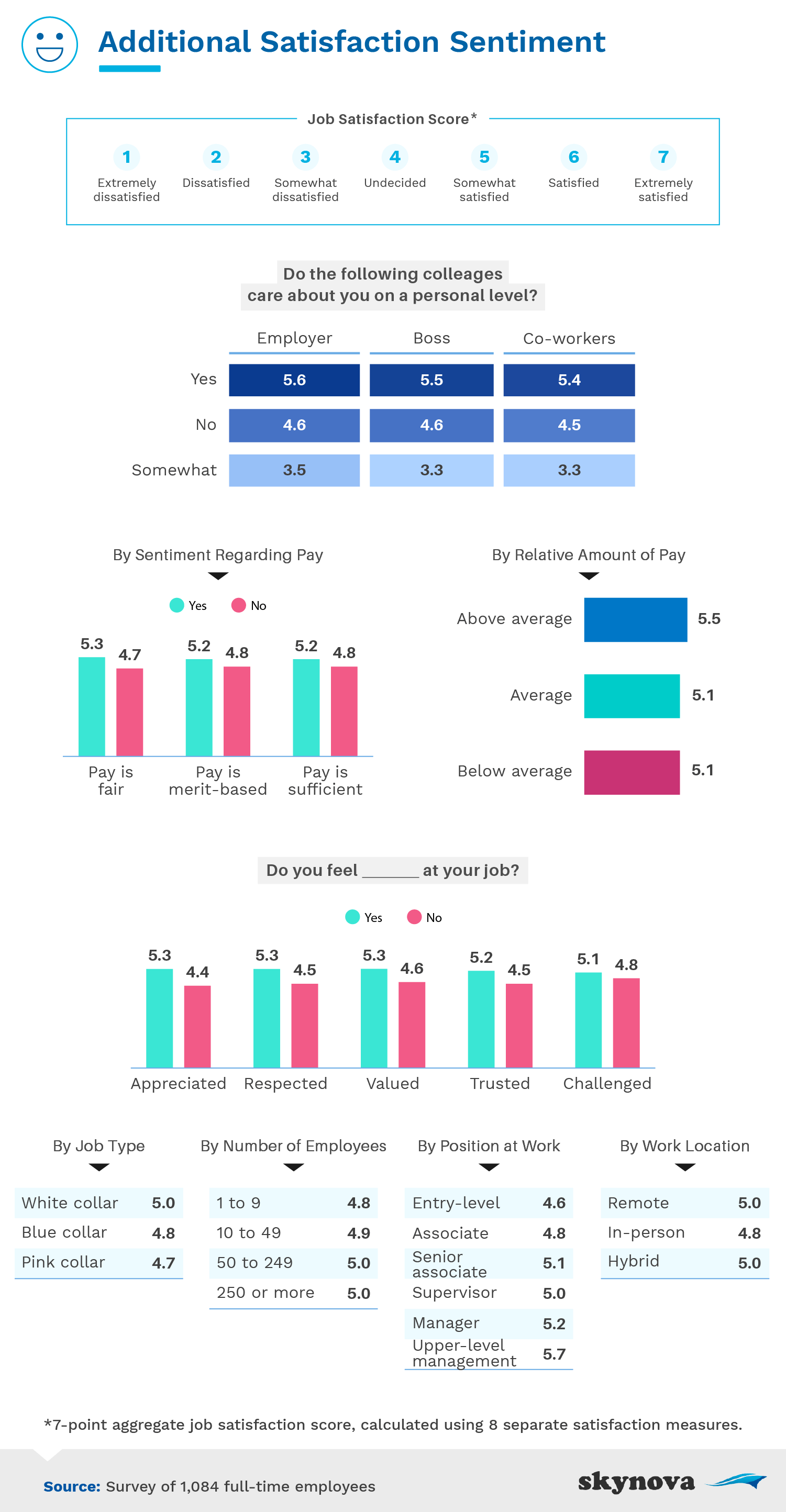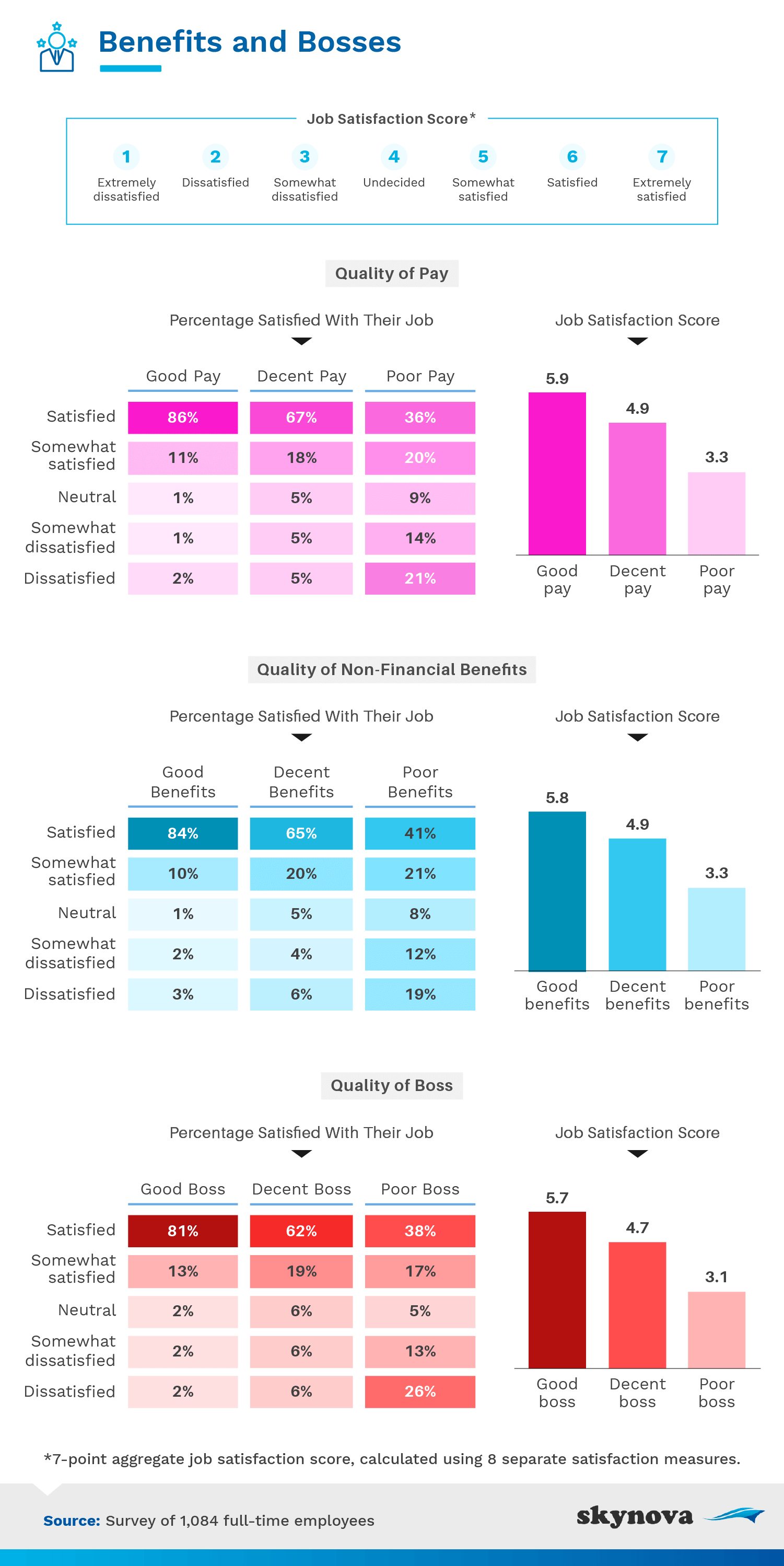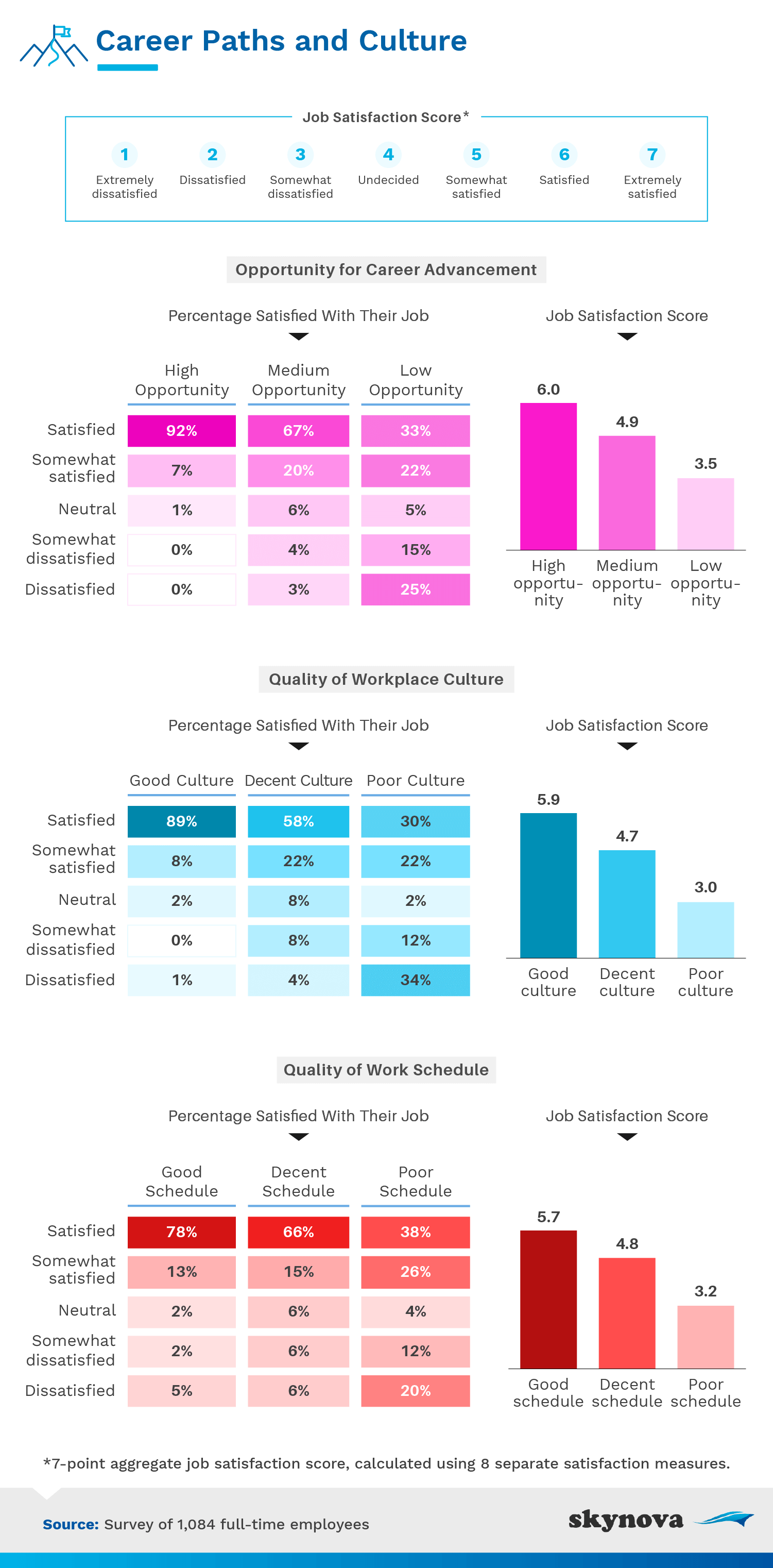
|
Many people strive to work their "dream jobs", which is usually something that they love to do. While enjoying your work is one element of job satisfaction, there are other factors that determine how happy you are when you clock in at the office. We surveyed over 1,000 full-time employees about different job satisfaction-related aspects and employer characteristics to better understand how happy they are with their current working lives.
Our respondents answered questions pertaining to how they're being treated at work, whether it be related to their social, financial, or any other career-related reality. We then compared those responses to a seven-point job satisfaction scale. Read on to learn more about the most important factors higher-ups need to consider if they want to keep their employees around long term.
In our first analysis of job satisfaction, we compare job sentiment across a variety of work-related factors.

Among almost all of the eight employer characteristics, the more employee-oriented they were, the higher the job satisfaction. Employees who felt very comfortable expressing themselves, worked at a company with an extremely high retention rate, received a ton of feedback, were treated very fairly, were rewarded exceptionally for good performance, and had consistent and flexible schedules were overall happier. A high amount of positive feedback was the characteristic correlated with the highest employee satisfaction. Fortunately for our respondents, 35% reported a high or very high amount of positive feedback in their careers, and 64% reported a level that was at least somewhat high.
One characteristic brought down the average, though: decision-making culture. Respondents working at companies that were very employee-led weren't quite satisfied with that kind of structure. In fact, the highest satisfaction was seen amongst companies that were only somewhat employee-led or somewhat management-led. While there are some benefits to increased employee involvement, it has its downsides, too. If employees are very involved in decision-making processes, it can blur the lines between them and upper management, jeopardizing the structure and stability of an organization. Also, the increased lines of communication may lead to inconsistent and overly complex discourse regarding business decisions.
Let's see how employees feel about how they're treated at work. How might certain factors affect their satisfaction?

When asked if their employers, supervisors, and coworkers cared about them on a personal level, respondents' answers were relatively consistent throughout. Those who felt appreciated scored their job satisfaction higher than five out of a possible seven, indicating that stronger personal connections at work have a noteworthy impact on job satisfaction. Among our respondents, 48% felt their employer cared about them on a personal level, while 54% and 60% felt their boss and coworkers did, respectively.
On the topic of pay, scores were somewhat close, but there was a clear trend showing higher job satisfaction among respondents who felt their pay was fair, merit-based, and sufficient. Those who said it was all or some of those things had a job satisfaction score in the low five range, and those who were unhappy with their pay averaged in the high fours. This also held true when broken down by salary level: People making above-average money were more satisfied with their pay by a margin of 0.4 compared to people making average or below-average salaries.
Naturally, employees who felt appreciated, respected, valued, trusted, and challenged at their jobs also felt much happier at work. Treating employees with respect almost certainly leads to increased productivity, and there are different ways managers can ensure they build strong relationships with employees. Being a good listener, communicating with subordinates often, and rewarding good work are all great starts. While only 38% of respondents felt challenged at work, more than half of respondents felt trusted (63%), appreciated (55%), respected (55%), and valued (54%) at work.
People working white collar jobs, at a company with one to nine people, in an upper management position, and working at home exhibited the highest rates of job satisfaction compared to other work scenarios.
How satisfied are respondents with the quality of a few key job-related aspects, and how does that influence job satisfaction?

As one might have guessed, the less satisfied someone was with their financial compensation at work, the less satisfied they were with their job overall. People with good compensation were the most satisfied (5.9 average), decent compensation led to lesser satisfaction (4.9 average), and those with poor compensation were slightly dissatisfied with their jobs (3.3 average). Thirty-five percent of our respondents reported good pay, while 44% said their pay was decent. A near identical trend can be observed regarding non-financial work benefits and the quality of their boss: The worse they were, the lower the job satisfaction. This is great news for a majority of our respondents: more than half reported having a good supervisor (51%), and 31% reported a decent supervisor. Satisfaction with benefits was slightly lower but still relatively positive, with 41% enjoying good benefits and 38% considering their benefits decent.
Employers who are able to hit a home run on each of these factors stand to benefit immensely. For example, competitive compensation can attract top talent to your workplace. Meanwhile, employee benefits demonstrate that you are invested in the health and well-being of your employees, therefore creating a heightened sense of loyalty. Lastly, a competent supervisor can boost morale by displaying strong leadership and communication skills.
Let's assess the quality of a few more key job-related aspects, from the perspective of our respondents.

The next three work aspects we asked about were the opportunity for workplace advancement, quality of workplace culture, and quality of work schedule. While people with advancement opportunities and a great work culture were clearly more satisfied than people with mid- or low-tier realities, the scores regarding quality of work schedule were a little closer: 78% of people with a good schedule were satisfied at work, but so were two-thirds of workers with decent ones, and even 38% with poor ones
While this particular job aspect didn't hold as much weight as the others, a better schedule was still correlated with a higher level of job satisfaction. Half of our respondents believed they were working a good schedule, and 35% believed their schedule was at least decent. Far fewer considered their career advancement opportunities high (37%), but nearly half (45%) felt their employer had a good workplace culture.
Especially now that many employees have been working remotely, people's schedules have become more flexible too. This setup eliminates the headache of morning commutes, like waking up early and having to shell out money for gas or bus fares. Working from home means that many employees can start and end their days as they choose, as long as their work is getting done. Considering the connection between a good schedule and higher job satisfaction, that's good news for many remote workers!
Unsurprisingly, the better employees were treated, the more satisfied people were with their jobs. It was only when employees were given a lot of decision-making power that this freedom didn't translate to feelings of joy, because the gap between management and subordinates can become cloudier, and communication tends to go awry.
Regarding the microenvironmental factors of an employee's work life – such as their financial compensation, benefits, career advancement opportunities, and work schedule – the better the quality, the higher the satisfaction. Happy employees are the foundation for organizational success, and managers should focus on establishing the necessary culture to not only survive, but thrive.
Skynova's 37 online software modules are specifically designed to help small businesses take care of their invoicing needs in an efficient and organized manner. We also enjoy producing content, especially ones revolving around a business or workplace angle - in this case, we took an in-depth look at employee job satisfaction. We've conducted surveys, research and compiled statistics and used additional secondary sources to back up our findings and create an insightful and informative piece.
For this study, we surveyed 1,084 full-time employees. Among those respondents, 619 were male, 462 were female, 2 identified as nonbinary, and 1 preferred not to report their gender. Our respondents ranged in age from 18 to 76 with an average age of approximately 38.
Our job satisfaction score was calculated using 8 separate categories. Respondents rated their satisfaction on a scale of 1-7 in each category, and those scores were averaged for each respondent. The categories were: job overall, employer, work culture, career advancement, supervisor, schedule, pay, and benefits.
To help ensure valid responses, all respondents were required to identify and correctly answer an attention-check question. In some cases, questions and answers have been rephrased for clarity\. These data rely on self-reporting. Potential issues with self-reported data include, but are not limited to: attribution, exaggeration, telescoping, and selective memory.
On the topic of satisfaction, we highly encourage, and would be delighted if you shared this article with your friends and family. We just ask that you do so for noncommercial use only, and to provide a link back to the original page for access to all of our methodologies and findings.